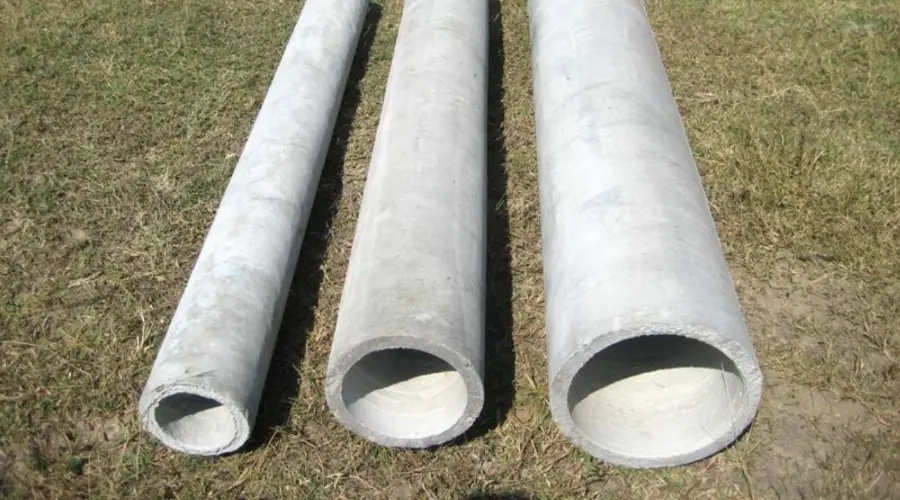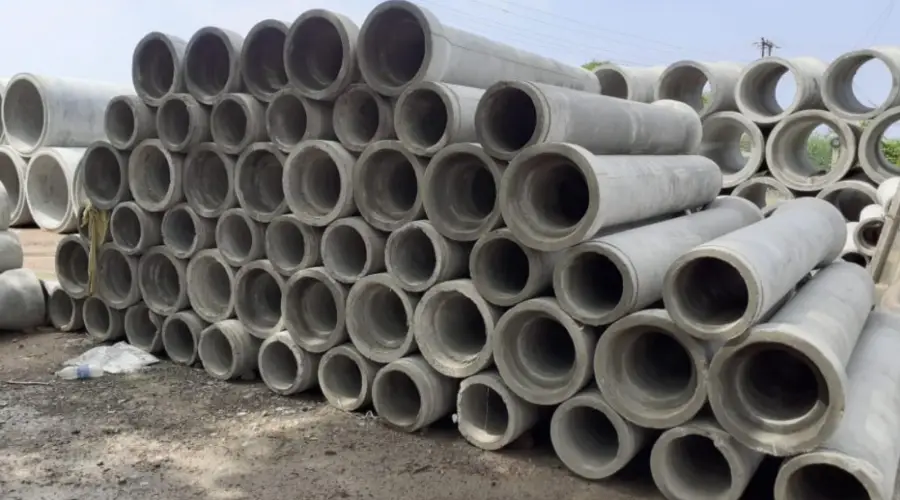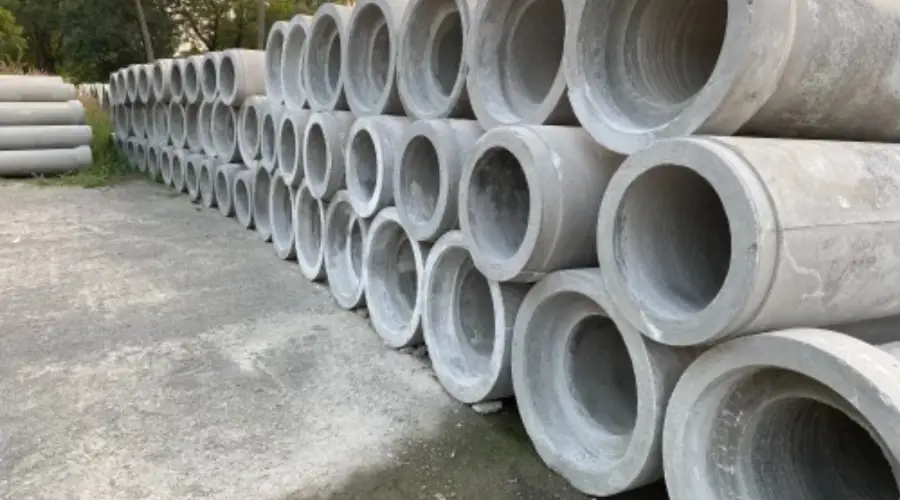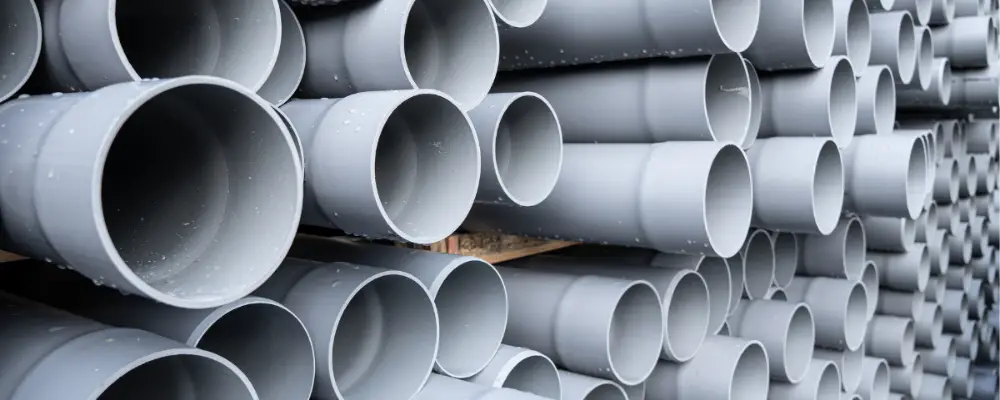Ever wonder how underground pipes installed decades back remain intact? The secret is RCC pipes. They form the backbone of underground construction necessary to modern life. Extensively used in irrigation drainage, sewage, and supply water systems, RCC pipes are a reliable choice for homes and businesses due to their strength, flexibility, and resistance. They are highly practical since their lifespan is long, requiring very minimal maintenance. An RCC pipe is durable and robust, resisting harsh weather and other loads in different applications while still ensuring great performance and longevity.
In this article, we will be discussing types, usage, how they are made, and specifications so that you can make smart choices in your usage.
What are RCC Pipes?
RCC pipes are part of infrastructural development such as water drainage, culverts, waste treatments, and irrigation. They suit these applications more than other piping materials since they can resist sewage toxins, are leak-proof, and can easily be repaired. Concrete pipes stand out as the top choice for these jobs compared to other materials. They’re a fit-and-forget option that can easily last about 100 years.
Types of RCC Pipes
This is a simplified overview of the several kinds of RCC pipes:
NP2 RCC Pipes:
Light-duty NP2 RCC pipes are utilised for irrigation and drainage in low-traffic locations. They are made to be used in areas with low pressure.

NP3 RCC Pipes:
Medium-duty NP3 RCC pipes are appropriate for irrigation and drainage in locations with moderate traffic. They serve as non-pressure pipes as well.

NP4 RCC Pipes:
Heavy-duty NP4 RCC pipes are utilised for irrigation and drainage in high-traffic locations. They are non-pressure pipes, just like the others.

Manufacturing Process of RCC Pipes
The production of RCC pipes relies on two principal methods: vertical vibrated casting and spinning.
Vertical Vibration Casting Process:
The vertical vibration casting method shapes and hardens the RCC mixture into tough pipes. Workers place a steel reinforcement cage in a mould and then pour concrete into an upright form. A vibrating table under the mould helps get rid of air bubbles, which results in a smooth, even finish and packs the concrete mix. This shaking not only makes the pipes look polished but also boosts their strength and toughness.
The Spinning Process:
The spinning process is a fascinating method used to create RCC pipes. It starts with placing a steel cage inside a horizontally positioned steel mould mounted on wheels. As the mould begins to spin at high speed, the RCC mixture is poured in. The rapid rotation uses centrifugal force to evenly spread the mixture against the mould walls, shaping it into a perfect cylindrical pipe. This spinning action not only ensures a smooth, uniform finish but also gives these pipes their nickname—spun pipes. Compared to the vertical vibrated casting method, the spinning process is faster and more efficient, making it a popular choice for manufacturing RCC pipes.
Applications of RCC Pipes in Residential Construction
Here’s how RCC pipes add value and reliability to our homes:
1. Sewerage Systems
RCC pipes handle wastewater efficiently, ensuring smooth flow and dependable performance for years. Their resistance to corrosion and high durability make them a solid choice for residential neighbourhoods, keeping households running worry-free.
2. Stormwater Drainage Systems
Heavy rains and waterlogging can be stressful for homeowners, but RCC pipes are here to solve the issue. They handle large water flows, preventing flooding in basements and low-lying areas. Their strength makes them a reliable choice for rain-prone regions.
3. Culverts
Think about the pathways in residential complexes or even garden walkways. RCC pipes often form the foundation of culverts, allowing water to pass safely beneath roads and driveways. This not only prevents erosion but also keeps these surfaces intact and smooth for everyday use.
4. Water Supply Systems
A steady water supply is vital for every home, and RCC pipes make it possible. They can handle high pressure, whether for multi-story buildings or connecting homes to the main water line. Designed for durability, they provide steady and reliable water flow.
5. Irrigation Systems for Landscaping
A beautiful garden makes a house feel like home. RCC pipes ensure lawns stay green and plants thrive by efficiently delivering water where it’s needed. Their strength and reliability make them perfect for keeping outdoor spaces vibrant and healthy.
Specifications of RCC Pipes
The key specifications of hume pipes as per IS (Indian Standards) 458:2003 are as follows::
Diameter:
Hume pipes can have internal diameters ranging from 80 mm to 2600 mm.
Wall Thickness:
The thickness of the pipe walls typically ranges from 25 mm to 215 mm, depending on the pipe’s diameter and kind.
Length:
2 or 2.5 meters are the typical lengths for hume pipes.
Pipe Weight:
The weight of Hume pipes can range between 80 kg and 10 tonnes, based on their size.
RCC pipes come in a variety of lengths and diameters, as listed below:
| S.No | Diameter Range | Available Length | Class of RCC Pipe |
| 1 | 150 mm to 300 mm (6 inches to 12 inches) | 2 meters (6.56 feet) | NP2, NP3, NP4 |
| 2 | 300 mm to 2200 mm (12 inches to 88 inches) | 2.5 meters (8.2 feet) | NP2, NP3, NP4 |
| 3 | 150 mm to 1000 mm (6 inches to 40 inches) | Varies, generally 2 meters or 2.5 meters | NP2 (Light Duty), NP3 (Medium Duty), NP4 (Heavy Duty) |
| 4 | 150 mm to 2200 mm (6 inches to 88 inches) | Varies, generally 2 meters or 2.5 meters | NP3, NP4 (Medium to Heavy Duty) |
Advantages of RCC Pipes
- As RCC pipes are durable and able to support large loads, they perform extremely well in underground operations.
- They last over 100 years, so replacements aren’t needed often.
- These pipes are ideal for sewers and factories, resisting chemicals and rust effectively.
- In tunnels and below-ground structures, they boost safety by not catching fire.
- Effective fluid flow is promoted by the smooth inside surface of RCC pipes, which lowers friction and energy consumption.
- As RCC pipes are recyclable and constructed from locally produced materials, they are environmentally beneficial.
- They are cheap and, with their low maintenance needs, can save money in the long run.
- Due to their versatility, RCC pipes are used extensively in many different systems-irrigation, sewerage management, drainage systems, and water supply amongst others.
Conclusion
To wrap up, RCC pipes offer a reliable, durable, and cost-effective solution for various underground applications. Their exceptional strength, resistance to chemicals, and ability to withstand fire make them ideal for essential infrastructure systems like sewage, drainage, and water supply. These pipes have an impact on both residential and commercial construction projects due to their flexibility in different systems. This makes them a key component in modern infrastructure.

